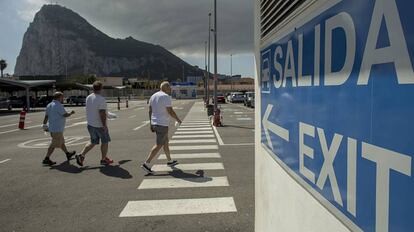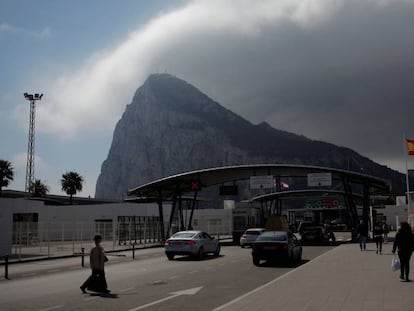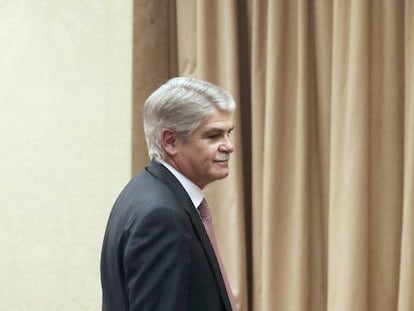Gibraltarians refuse to be used as bargaining chip in Brexit negotiations
People living in territory say its status should not be part of talks over UK’s departure from EU

Christian Hernández, president of the Gibraltar Chamber of Commerce, recently summed up the feelings of the 33,000 residents of this small overseas territory that shares a border with Spain’s southern Cádiz province, and which has suddenly found itself at the heart of the Brexit controversy.

“The whole tone needs to come down a little,” says Hernández. “The EU told Britain not to use people as a bargaining chip. And now Brussels, under diplomatic pressure from Spain, is doing just that: using Gibraltar as a political football. We view that as a hypocritical attitude.”
His words come after several days of escalating rhetoric over the draft Brexit negotiation guidelines, which regulate the “divorce” between Britain and the European Union. A clause in the guidelines states that “no agreement between the EU and the United Kingdom may apply to the territory of Gibraltar without agreement between the Kingdom of Spain and the United Kingdom.”
I don’t want to sound apocalyptic, but the situation is very complicated
Juan Franco, mayor of La Línea
This effectively means that any future trade deal between the UK and EU cannot be extended to Gibraltar without Spain’s consent. Madrid hopes this will force London to sit down to bilateral talks over the status of the disputed territory, which was ceded to Britain under the Treaty of Utrecht in 1713.
On the streets of Gibraltar, people seem to share a sense of impatience at a renewed possibility of co-sovereignty over the Rock. In a 2002 referendum, 99% of Gibraltarians voted to remain part of the UK. “The consultation was very clear, and I wouldn’t say anything else now, despite Brexit,” says local resident Claire Montado.
But it remains a fact that at the Brexit referendum of last year, 96% of Gibraltarians voted to remain part of the EU.
John Carreras, a local businessman, admits that Gibraltarians are tense because, in the coming two years, Britain, Spain and the EU are going to “throw rocks at one another and we’ll see how things work out. Spain could close the border, but I don’t think it will do so because of its own workers [around 12,000 Spaniards cross into Gibraltar every day to work there].”
We know that Gibraltarians are not going to allow co-sovereignty. This means we are at a dead end
Juan José Uceda, president Association Spanish Workers in Gibraltar
John King, another resident, adds: “We are an obsession for Spain, and every time there are problems Gibraltar comes up. The referendum was very clear, we don’t need to express our opinion again. All we want is an agreement so that both sides can live in harmony.”
Gibraltar Chief Minister Fabian Picardo has used harsh words against Spain, saying that “paying” for Brexit with the Rock would allow Spain to behave like a bully. In statements to Reuters, he also attacked the president of the European Council, Donald Tusk, whom he compared with “a cuckolded husband who is taking it out on the children.”
“We are not going to be a bargaining chip, and we are not going to be a victim of Brexit as we are not the culprits of Brexit: we voted to stay in the European Union so taking it out on us is to allow Spain to behave like a bully,” he told the news agency.
Unnecessary words
Former Tory leader Michael Howard’s recent comment about the possibility of sending a military force to defend Gibraltar, just like Britain once did with the Falkland Islands off Argentina, has raised eyebrows among residents there.
Jonathan Sacramento, the news chief at the local television station GBC, called Howard’s words “uncomfortable” and a way to “unnecessarily raise the temperature.” Yet the controversy could cause Britain to take Gibraltar more into account during the complicated Brexit negotiations up ahead.
“There is great skepticism regarding how high up we are on the list of the UK’s priorities,” says Sacramento. “The truth is that we don’t know how Brexit will affect us. Therein lies the uncertainty and anguish.”
Concern over the Brexit negotiations affects Gibraltarians, but also Spaniards and other EU nationals (mostly Poles and Romanians) who cross into Gibraltar every day to work in construction, online gaming and insurance companies.
“Just as we feared, negotiations are not going to be the same here with inter-border workers as it will be in Almería for its vegetable exports or in Alicante with its large British community. We know that Gibraltarians are not going to allow co-sovereignty. This means we are at a dead end,” says Juan José Uceda, president of the Association of Spanish Workers in Gibraltar.
Uceda criticized the Spanish government’s contempt for Gibraltar’s role as a driver of growth in an economically depressed region compared with other parts of the coast that will be affected by Brexit.
Besides the 12,000 Spanish workers, Uceda notes that every day, around 200 trucks cross into the British overseas territory loaded with Spanish products. “That will be another serious blow to the local economy. New hurdles at the border would mean great economic losses.”
Meanwhile Juan Franco, the mayor of La Línea, the Spanish municipality adjoining Gibraltar, underscores the fear that the Gibraltar economy could collapse just like its public works, causing “a business exodus.” This would, in turn, mean lower spending by Gibraltarians in his city, a scenario which he described as “cataclysmic.”
“I don’t want to sound apocalyptic, but the situation is very complicated. We hope that the government will take appropriate measures, because we already lost 40% of our population in 1969 [when Spain closed the border in response to a sovereignty referendum],” he says.
The consequences and restrictions of rights for Spanish workers remain unknown, although just the fact of having to show one’s passport at the border would effectively create hours of traffic lines.
“They would start with the passport and then who knows what else. The Socialist Party signed some treaties, and then the Popular Party came along and eliminated them all,” explains Harry Van Gils.
English version by Susana Urra.









































